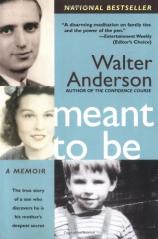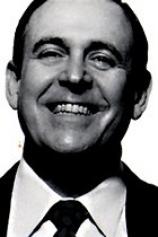Meant to Be
Review
Meant to Be
If, as the old saying goes, the past is never really past,
59-year-old Walter Anderson proves in MEANT TO BE that you do not
have to be imprisoned or destroyed by your past and that people can
overcome the secrets of their lives --- no matter how painful ---
through love, compassion and the truth.
This is an incredibly powerful and inspirational memoir that is
already being called a "coming-of-age classic." On the surface,
Anderson's life appeared to be the classic "rags to riches" tale.
Raised literally on the wrong side of the tracks in an impoverished
section of town, Anderson suffered horrific violence and abuse at
the hands of an alcoholic father. He dropped out of high school at
17, joined the Marines and began an improbable climb from the
tenements of his childhood to the executive suites of modern
American journalism --- first as editor for 20 years of the largest
circulation magazine in America, Parade, and now as chairman and
CEO of that publication.
But it's the secret lying beneath that surface that makes this book
so important. This is not simply the story of yet another victory
march. It is the story of a bewildered and deeply hurt child. "I
found myself becoming increasingly angry," he writes of his
childhood. "Undoubtedly, much of my rage grew out of the abuse and
fear I lived with every day at home. But I had a deeper
frustration: I didn't seem to belong anywhere…I was
different. And the aching feelings of loneliness and doubt, which I
kept to myself, hurt more than my father's frequent
beatings."
Haunted by that doubt, the 21-year-old Anderson asked his mother a
question on the day of his father's funeral in 1966: "The man we
just buried…Was he my father?" She confessed that his real
father was a man named Albert Dorfman, who she fell in love with
during World War II when her husband was in the service. He further
learned that his real father was Jewish, and he had a stepbrother
alive somewhere.
Anderson's mother, Ethel, is the real hero of this book. Fearing
for her child's life if her husband ever learned the truth, she
immediately ended the affair and eventually broke off all contact
with the love of her life. The passage where she takes her infant
son to meet his real father in Grand Central Station is poignant
and heartbreaking. But Ethel also acted as a buffer between young
Walter and her husband, putting her body between them and trying to
deflect the older man's violence whenever possible. Fearful of the
impact the truth would have on Walter's older brother and sister,
she made him promise to keep her secret for as long as his siblings
lived. He also promised not to seek out his real father.
Anderson kept his word and ended up having to wait 35 years before
seeing a picture of his real dad, who, ironically enough, died the
year before the man he thought was his father. Once his mother
freed him from his promise, he began a search that led him to his
older stepbrother Herbert, who, he learns, has lived an eerily
"parallel life" to his own. His search also helped him discover his
spirituality and Jewish heritage. It ended with the reunification
of a long-lost family. The alienated, angry child, who belonged
nowhere in the world, finally found his home and true inner
peace.
What is remarkable about this book is that, despite its high drama
and emotion, it is written without an ounce of self-pity or
sentiment. Anderson pulls no punches in talking about his own
darkness or the shortcomings of his mom. The language is simple and
the story is told with a great editor's eye for language. The
result is a calm and understated narrative that becomes almost
lyrical at times. He tells us: "Much of my childhood was like a
dull rain punctured by noisy and unforgettable explosions of
lightning."
MEANT TO BE is a courageous book, full of warmth, humanity and
hard-earned wisdom. This is not a victim's story. Indeed, it
transcends the memoir format to teach us all a lesson in hope and
the power of love.
Anderson's life could have taken an entirely different path.
Certainly, that "lightning" could have destroyed him, physically
and emotionally. But he describes reading himself out of poverty
long before he worked his way out. He was probably the only kid to
cut school so he could go the library. "Books," he writes, "had a
magic about them: I could open a page and be anywhere. I could be
anyone. I could imagine myself out of a slum." He also pays tribute
to a wonderful neighborhood woman, Ilza Williams, who showed an
interest in him, encouraged him and taught him that education was
"a voyage that never ends."
As an editor and activist, Walter Anderson has worked hard to help
kids in trouble and promote literacy and education. He has
distinguished himself in life by striving for things larger than
himself, and therein lies the enduring message of this book. At his
mother's wake in 2001, he thought, "you freed me with the truth."
That truth, along with a lot of compassion and love, can do the
same thing for us all.
Reviewed by Tom Callahan on January 22, 2011
Meant to Be
- Publication Date: September 7, 2004
- Genres: Nonfiction
- Paperback: 256 pages
- Publisher: Harper Paperbacks
- ISBN-10: 0060099070
- ISBN-13: 9780060099077




